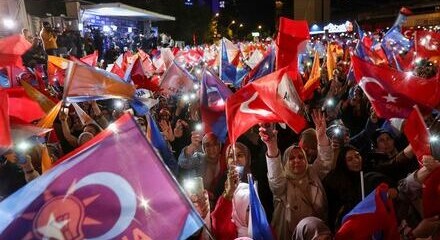01.06.2023

Small choice between rotten apples
Though Erdoğan deserved to lose, the opposition did not deserve to win. Esen Uslu makes a call for the left to unite on a principled basis
The second-round run-off for Turkey’s presidential election took place on May 28, and the incumbent, Recep Tayyip Erdoğan, won by a very small margin - 52% to 48% for his opponent, Kemal Kılıçdaroğlu. In the 2018 elections, Erdoğan won in the first round with 53% of the vote in a six-candidate race. Despite his cohorts’ attempts to describe the result as an emphatic win, his popularity has clearly declined.
He may have failed to win an outright first-round majority, but without a particular last-minute failure of the opposition candidate he might have not won the run-off. Sinan Oğan, the far-right candidate, had won about 5% of the vote in the first round, and the crucial problem for both second-round contestants was how to claw back some of those nationalist votes.
Erdoğan got Oğan’s endorsement before the run-off, but it was not certain how much of his support he could carry with him. Meanwhile, Kılıçdaroğlu opted to seek the support of a minor partner in the opposition alliance, but the price demanded was that Kılıçdaroğlu would not support basic Kurdish demands. Kılıçdaroğlu signed such an undertaking to much fanfare.
Despite that cocking-a-snook, a large section of the Kurdish population continued to support Kılıçdaroğlu - as was clear from the votes in the Kurdish provinces. However, the level of participation was far lower than in the first round, compared to other parts of the country and that made a huge difference - the effect was most pronounced in the principal cities.
Kurdish groups were not very clear about the reason for their support to Kılıçdaroğlu. They did not unequivocally state that they were supporting him, because primarily they were voting against Erdoğan. Instead, there were mild-mannered and ‘politically correct’ support messages. The basic mistake was that they believed that there was a chance of toppling Erdoğan, if the entire opposition pulled in the same direction, and the campaigning language was modified accordingly.
The massive earthquake damage and loss of life (and the pitiful response from the state emergency services), plus a brutal decline in living standards due to massive price hikes - all those factors gave this electoral tactic some credibility. However, the two-week campaign for the run-off clearly showed that the opposition was neither united nor pulling in the same direction.
Kılıçdaroğlu and the Nation Coalition that supported him opted to imitate and outdo Erdoğan in nationalism, racism and xenophobia. Kılıçdaroğlu’s final rostrum-thumping speeches were about his promise to send Syrian refugees ‘back to where they belong’ - and, of course, to defeat terrorism. Previously undecided voters flocked back to the original instead of supporting its tattered copy.
The outcome of the run-off displayed how polarised the voters were. Half of the voters were sticking with Erdoğan, while the other half wished to see him off. However, there was no clarity on what policies the opposition would pursue to cope with the difficulties ahead, while Erdoğan’s ability to borrow and spend big seemed sustainable. His message was ‘stability’ and ‘order’, while Kılıçdaroğlu was unable either to counter that or keep his coalition together.
Among Erdoğan’s sops to the Islamist conservative voters was his rabid anti-LGBT rhetoric and anti-feminist misogyny veiled behind a commitment to “sacred family values”. He attacked both Kılıçdaroğlu’s Alevi religious background and the secular opposition as a whole. He condemned both those ‘enemies of family values’ and those ‘whose foreheads never touch the ground for prayers’.
Such messages were given full support by religious brotherhoods in the conservative Muslim milieu, and there was no effective counter from the Kılıçdaroğlu camp. Yet, despite that, almost half of the voters did not heed Erdoğan’s warnings and voted for his opponent.
Meanwhile, the nationalist-racist and fascist current as a whole has gathered strength despite the fact that the distribution of the votes has not changed much. Erdoğan’s Justice and Development Party (AKP) has lost ground, but its far-right coalition partner, the Nationalist Movement Party (MHP), increased its vote. Within the opposition Republican People’s Party (CHP), the rightwing current seems to have grown stronger, while various smaller parties have gained some influence.
In the near future the almost senile leader of the MHP will soon be replaced, and there is a shoulder-butting race to take over his position among the nationalist-racist-fascists. But Erdoğan needs MHP’s unwavering support to stay in power, so the outcome of the leadership contest could be very significant. The MHP is also one of the main instruments through which the army bureaucracy and top brass attempts to give direction to Erdoğan’s policies.
The question posed by the outcome of the election is: will Erdoğan be able to complete his third five-year term as president? Both the gathering storm clouds in and around Turkey’s borders and the unorthodox economic policy hodgepodge suggest that it is highly unlikely that the rightwing coalition of Islamism and nationalist-racists will still want him by the next election.
In 2024 there will be local elections. Back in 2019 the AKP lost several mayoralties in principal cities and next year they will attempt to regain them. However, the AKP’s continuing loss of support and Erdoğan’s own diminishing popularity do not bode well for them. The outcome of those elections might decide both his position as leader and the AKP’s position within the conservative camp.
For working people, the illusions of an alternative government under the CHP or CHP-led coalition have been shattered. However, building an internationalist, working class movement, fighting in solidarity with the Kurdish freedom movement and encompassing the rights of all the oppressed, requires more than shattered illusions. It requires unity around a principled programme.
